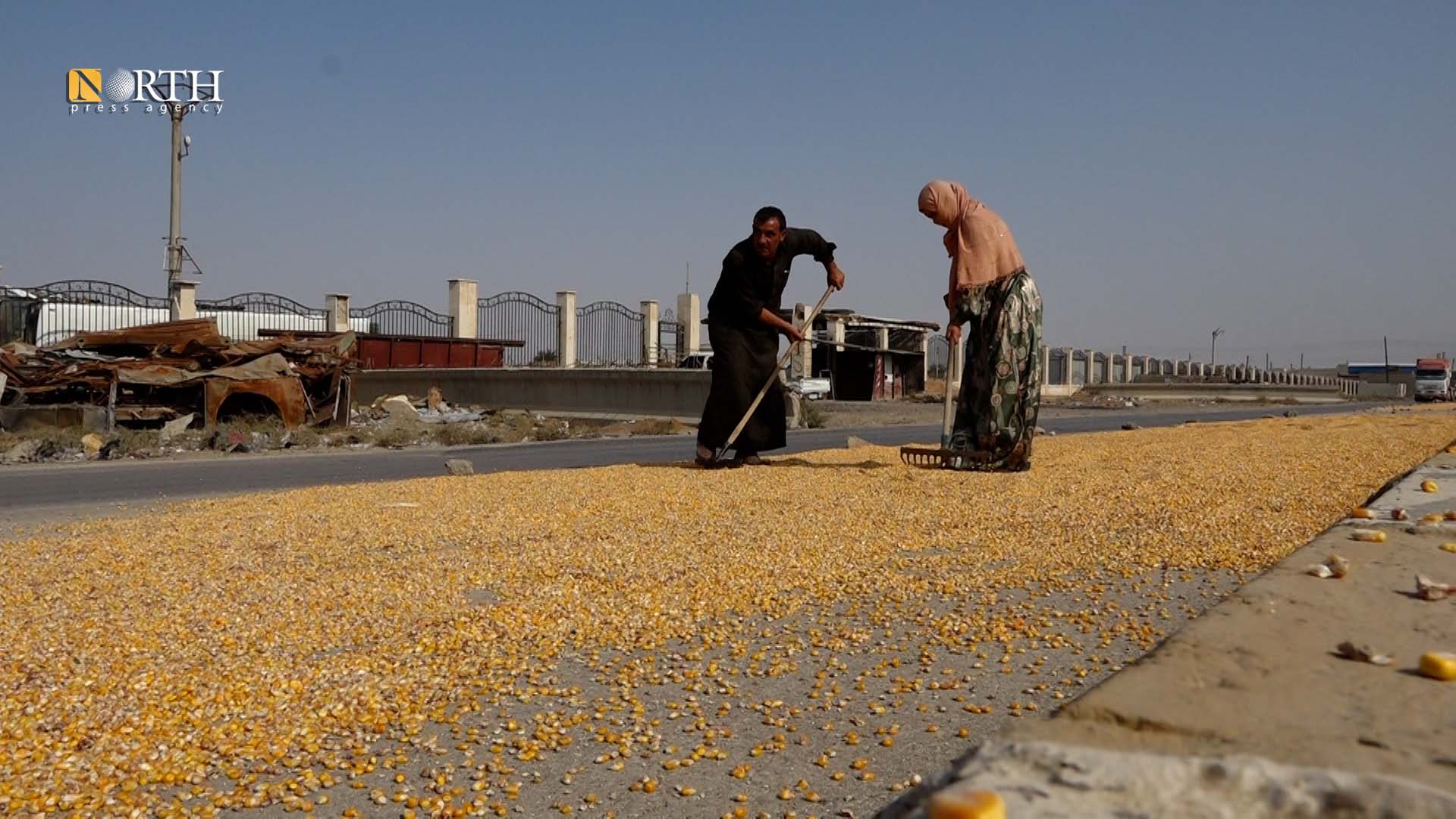RAQQA, Syria (North Press) – Since picking up his corn, Khalil al-Ahmad along his family members took their corn corps to be dried in a primitive way. The farmer has dispersed his corn on the highway between Huzaima Roundabout and al-Frousiya Bridge in the northern part of the city of Raqqa in northern Syria.
Al-Ahmad, 50, from the village of Asadiya, north of Raqqa, has chosen to dry his crops in this way waiting for a rise in prices as merchants “exploit” farmers’ need to meet their debts, hence it is sold in return for “very cheap” prices.
On October 19, the Autonomous Administration of North and East Syria (AANES) allowed corn are exported outside its areas attributing the decision to its inability to buy the crop from the farmers.
The AANES was first formed in 2014 in the Kurdish-majority regions of Afrin, Kobani and Jazira in northern Syria following the withdrawal of the government forces. Later, it was expanded to Manbij, Tabqa, Raqqa, Hasakah and Deir ez-Zor after the SDF defeated ISIS militarily there.
The decision was met with dismay by al-Khalil and other corn farmers in general owing to the high prices they paid for their agricultural needs which they bought in USD.
Though the AANES has allowed the exportation of the crop from all crossings, corn still maintains a low price.
In Raqqa, a kilo of corn is sold in return for 1.300 SYP, while if unpicked, it is sold for 800 SYP.
Last year, the AANES priced the corn at 1.100 SYP per kilo. It was widely mixed with flour dough and made into bread.
The Syrian government priced a kilo of corn at 1.750 SYP. 200 SYP was added to a kilo as an encouragement for farmers to deliver their crops to government centers. That is, a kilo was sold for 1.950 in total.

Highways
Though Raqqa’s corn dryer was announced ready to receive the crops by Agricultural Community Development Company in Raqqa, none a farmer has taken his crops to the dryer which would eventually add more unneeded burdens to the farmers.
The AANES has not yet set any price for drying corn. Purportedly, however, a ton is said to be dried in return for 300.000 SYP (about $55).
Discontented, al-Ahmad added that the AANES did not purchase corn and “tries to get profits from the drying process. The [AANES] let us down, it does not purchase our corps; we have no choice [to dry out corps] but on highways.”
Dispersing corn on the ground is not a safe option as this could make it a prey for robbing, putrefaction and traffic suffocation in addition to accidents, notably of motorbikes.
Next to al-Ahmad is Mustafa al-Abdo, 40, a farmer from Mazraat Hittin, west of Raqqa. Al-Abdo was compelled to transfer his crops to be dispersed onto a road at the outskirts of the city for drying. There are no spaces in his own village.
“Merchants pay 800 SYP per kilo, this is unacceptable; it does not cover expenditures.”
As the set price does not appeal to al-Abdo, the man along his family spent the cool nights on the road.
Large amounts only
Farmers claim the corn dryer is being invested by merchants exclusively. Small amounts are not allowed entry to the dryer, they claim.
However, co-chair of Agricultural Community Development Company in Raqqa, Ahmad al-Ali denied the dryer is being invested by merchants, “These are groundless rumors, primarily this dryer works for farmers.”
“We expected mass product of corn in Raqqa. We broadened the drying capacity to 1.700 tons per day,” al-Ali added.

However, there are four sub-dryers within Raqqa’s dryer. Each receives at least 40 tons per day, this implies even owners of little amounts are allowed to.
Each sub-dryer would be allotted to a specific sector in coordination with Farmers’ Societies, the Agriculture Committee and Guidance Centers, according to al-Ali.
Regarding the price to be set for drying, al-Ali said they “await the AANES to issue [such a decision],” it is going to be [AANES] sponsored one to suit the costs.”
Ahmad al-Hussein along his family shares the same suffering. The 54-year-old man prefers hard work and pains to be ‘exploited” by merchants.”
Al-Hussein has decided not to sell his crops right now. He is going to store it to be sold later when payment could cover his expenditures.

